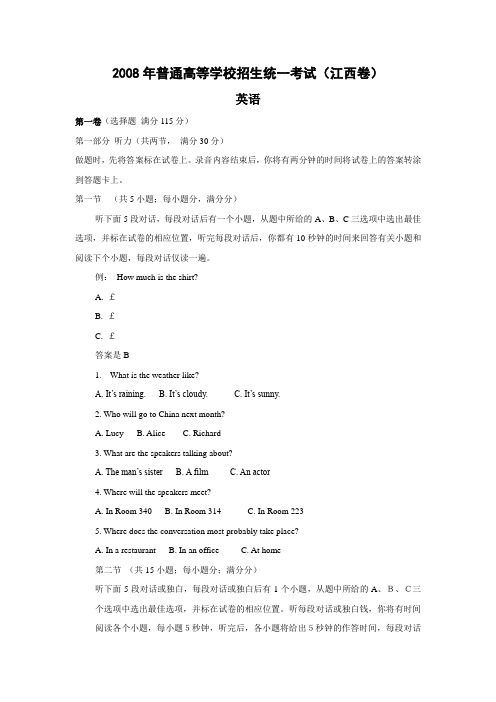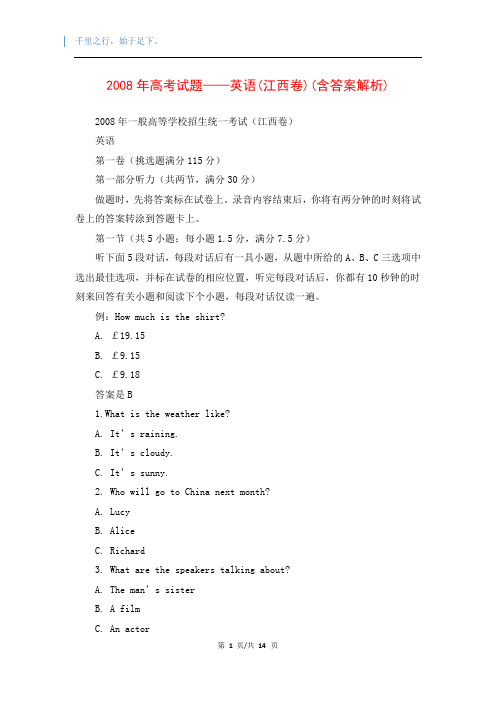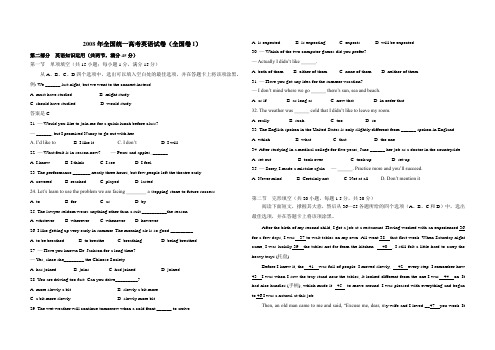2008年本科招生考试英语试题
2008年高考试题——英语(江西卷)(含答案解析)

2008年普通高等学校招生统一考试(江西卷)英语第一卷(选择题满分115分)第一部分听力(共两节,满分30分)做题时,先将答案标在试卷上。
录音内容结束后,你将有两分钟的时间将试卷上的答案转涂到答题卡上。
第一节(共5小题;每小题分,满分分)听下面5段对话,每段对话后有一个小题,从题中所给的A、B、C三选项中选出最佳选项,并标在试卷的相应位置,听完每段对话后,你都有10秒钟的时间来回答有关小题和阅读下个小题,每段对话仅读一遍。
例:How much is the shirt?A. £B. £C. £答案是B1.What is the weather like?A. It’s raining.B. It’s cloudy.C. It’s sunny.2. Who will go to China next month?A. LucyB. AliceC. Richard3. What are the speakers talking about?A. The man’s sisterB. A filmC. An actor4. Where will the speakers meet?A. In Room 340B. In Room 314C. In Room 2235. Where does the conversation most probably take place?A. In a restaurantB. In an officeC. At home第二节(共15小题;每小题分;满分分)听下面5段对话或独白,每段对话或独白后有1个小题,从题中所给的A、B、C三个选项中选出最佳选项,并标在试卷的相应位置。
听每段对话或独白钱,你将有时间阅读各个小题,每小题5秒钟,听完后,各小题将给出5秒钟的作答时间,每段对话或独白读两遍。
听第6段材料,回答第6至8题。
6. Why did the woman go to New York?A. To spend some time with the babyB. To look after her sisterC. To find a new job.7. How old was the baby when the woman left New York?A. Two monthsB. Five monthsC. Seven months8. What did the woman like doing most with the baby?A. Holding himB. Playing with himC. Feeding him听第7段材料,回答第9至11题9. What are the speakers talking about?A. A way to improve air qualityB. A problem with traffic rulesC. A suggestion for city planning10. What does the man suggest?A. Limiting the use of carsB. Encourage people to walkC. Warning drivers of air pollution11. What does the woman think about the man’s idea?A. It’s i nterestingB. it's worth tryingC. It’s impractical听第8段材料,回答第12至14题12. How long will the man probably stay in New Zealand?A. One week.B. Two weeks.C. Three weeks.13. What advice does the woman give to the man?A. Go to New Zealand after Christmas.B. Book his flight as soon as possible.C. Save more money for his trip.14. What can we learn about flights to New Zealand at Christmas time?A. They require early booking.B. They can be twice as expensive.C. They are on special offer.听第9段材料,回答第15至17题。
2008年高考试题——英语(江西卷)(含答案解析)

2008年高考试题——英语(江西卷)(含答案解析)2008年一般高等学校招生统一考试(江西卷)英语第一卷(挑选题满分115分)第一部分听力(共两节,满分30分)做题时,先将答案标在试卷上。
录音内容结束后,你将有两分钟的时刻将试卷上的答案转涂到答题卡上。
第一节(共5小题;每小题1.5分,满分7.5分)听下面5段对话,每段对话后有一具小题,从题中所给的A、B、C三选项中选出最佳选项,并标在试卷的相应位置,听完每段对话后,你都有10秒钟的时刻来回答有关小题和阅读下个小题,每段对话仅读一遍。
例:How much is the shirt?A. £19.15B. £9.15C. £9.18答案是B1.What is the weather like?A. It’s raining.B. It’s clou dy.C. It’s sunny.2. Who will go to China next month?A. LucyB. AliceC. Richard3. What are the speakers talking about?A. The man’s sisterB. A filmC. An actor4. Where will the speakers meet?A. In Room 340B. In Room XXXC. In Room 2235. Where does the conversation most probably take place?A. In a restaurantB. In an officeC. At home第二节(共15小题;每小题1.5分;满分22.5分)听下面5段对话或独白,每段对话或独白后有1个小题,从题中所给的A、B、C三个选项中选出最佳选项,并标在试卷的相应位置。
听每段对话或独白钞票,你将有时刻阅读各个小题,每小题5秒钟,听完后,各小题将给出5秒钟的作答时刻,每段对话或独白读两遍。
2008年全国统一高考英语试卷(全国卷Ⅰ)(含解析版)

2008年全国统一高考英语试卷(全国卷I)第二部分英语知识运用(共两节,满分45分)第一节单项填空(共15小题;每小题1分,满分15分)从A、B、C、D四个选项中,选出可以填入空白处的最佳选项,并在答题卡上将该项涂黑。
例: We ______ last night, but we went to the concert instead.A. must have studiedB. might studyC. should have studiedD. would study答案是C.21. — Would you like to join me for a quick lunch before class?— ______, but I promised Nancy to go out with her.A. I’d like toB. I like it.C. I don’tD. I will22. — What fruit is in season now? — Pears and apples, ______.A. I knowB. I thinkC. I seeD. I feel23. The performance _______ nearly three hours, but few people left the theatre early.A. coveredB. reachedC. playedD. lasted24. Let’s learn to use the problem we are facing ________ a s tepping-stone to future success.A. toB. forC. asD. by25. The lawyer seldom wears anything other than a suit __________the season.A. whateverB. whereverC. wheneverD. however26. I like getting up very early in summer. The morning air is so good _________.A. to be breathedB. to breatheC. breathingD. being breathed27. — Have you known Dr. Jackson for a long time?— Yes, since she________ the Chinese Society.A. has joinedB. joinsC. had joinedD. joined28. You are driving too fast. Can you drive_________?A. more slowly a bitB. slowly a bit moreC. a bit more slowlyD. slowly more bit29. The wet weather will continue tomorrow when a cold front ______ to arrive. A. is expected B. is expecting C. expects D. will be expected30. — Which of the two computer games did you prefer?—Actually I didn’t like ______.A. both of themB. either of themC. none of themD. neither of them31. — Have you got any idea for the summer vacation?—I don’t mind where we go ______ there’s sun, sea and beach.A. as ifB. as long asC. now thatD. in order that32. The weather was ______ cold that I didn’t like to leave my room.A. reallyB. suchC. tooD. so33. The English spoken in the United States is only slightly different from ______ spoken in England.A. whichB. whatC. thatD. the one34. After studying in a medical college for five years, Jane ______ her job as a doctor in the countryside.A. set outB. took overC. took upD. set up35. — Sorry, I made a mistake again. —______. Practice more and you’ll succeed.A. Never mindB. Certainly notC. Not at allD. Don’t mention it第二节完形填空(共20小题,每题1.5分,共30分)阅读下面短文,撑握其大意,然后从36—55各题所给的四个选项(A、B、C和D)中,选出最佳选项,并在答题卡上将该项涂黑。
2008年北京市普通高等学校招生统一考试英语试卷(A版)

2008年普通高等学校招生全国统一考试(北京卷)英语试卷第Ⅰ卷(选择题共115分)第一部分:听力理解(共两节,满分30分)第一节(共5 小题;每小题1.5分,满分7.5分)听下面5段对话。
每段对话后有一个小题,从题中所给的A、B、C三个选项中选出最佳选项,并标在试卷的相应位置。
听完每段对话后,你都有10秒钟的时间来回答有关小题和阅读下一小题。
每段对话仅读一遍。
例: What is the man going to read?A. A newspaperB. A magazineC. A book 答案是A1. What did the man win in his dream?A. A holiday.B. A new car.C. Some money.2. Will the woman come to the party?A. Maybe.B. NoC. Certainly3. How long has the woman been an author?A. About 30 years.B. About 40 years.C. About 70 years.4. What does the woman want?A. A radio.B. Some pens.C. Some batteries.5. What is the woman doing?A. Asking for information.B. Asking for an apology.C. Asking for help.第二节(共15 小题;每小题1.5分,满分22.5分)听下面5段对话或独白。
每段对话或独白后有几个小题,从题中所给的A、B、C三个选项中选出最佳选项,并标在试卷的相应位置。
听完每段对话或独白前后,你将有时间阅读各个小题,每小题5秒钟;听完后,各小题将给出5秒钟的作答时间。
每段对话读两遍。
6. How many coats does the woman want?A. 25.B. 30.C. 50.7. What is the order number for gloves?A. P25G5.B. P26T5.C. P28D5.听第7段材料,回答第8、9题。
2008年全国统一高考英语试卷(全国卷1)

2008年高考全国卷Ⅰ英语试题解析第一部分听力(共两节,满分30分)第一节(共5小题,每小题1.5分,满分7.5分)听下面5段对话,每段对话后有一个小题,从题中所给的A、B、C三个选项中选出最佳选项,并标在试卷的相应位置,听完每段对话后,你都有10秒钟时间来回答有关小题和阅读下一小题。
每段对话仅读一遍。
例:How much is the shirt?A. £19.15B. £9.15C. £9.18答案是B。
1. What is the weather like?A. It’s rAInIng.B. It’s cloudy.2. Who will go to China next month?A. Lucy.B. Alice.C. Richard.3. What are the speakers talking about?A. the mAn’s sIster.B. A fIlm. c. An Actor.4. Where will the speakers meet?A. In Room 340.B. In Room 314.C. In Room 223.5. Where does the conversation most probably take place?A. In a restaurant.B. In an office.C. At home.第二节(共15小题;每小题1.5分,满分22.5分)听下面5段对话或独白,每段对话或独白后面有几个小题,从题中所给的A、B、C三个选项中选出最佳选项,并标在试卷的相应位置。
听每段对话或独白前,你将有时间阅读各小题,每小题5秒钟;听完后,各小题将给出5秒钟的作答时间。
每段对话或独白读两遍。
听第6段材料,回答第6至8题。
6. Why did the woman go to New York?A. To spend some time with the baby.B. To look after her sister.C. To find a new job.7. How old was the baby when the woman left New York?A. Two months.B. Five months.C. Seven months.8. What did the woman like doing most with the baby?A. Holding him.B. Playing with him.C. Feeding him.听第7段材料,回答第9至11题。
2008年普通高等学校招生全国统一考试英语试卷及答案-湖北卷2008年普通高等学校招生全国统一考试英

2008年普通高等学校招生全国统一考试(湖北卷)英语本试卷共16页。
全卷满分150分。
考试用时120分钟。
第一部分:听力(共两节,满分30分)做题时,先将答案划在试卷上。
录音内容结束后,你将有两分钟的时间将试卷上的答案转涂到答题卡上。
第一节(共5小题;每小题1.5分,满分7.5分)听下面5段对话。
每段对话后有一个小题,从题中所给的A、B、C三个选项中选出最佳选项,并标在试卷的相应位置。
听完每段对话后,你都有10秒钟的时间来回答有关小题和阅读下一小题。
每段对话仅读一遍。
例:How much is the shirt?A.£19.15.B.£9.15.C.£9.18.答案是B。
1. Where does the conversation most probably take place?A. In an office.B. In a library.C. In a bookstore.2. Where did the speakers plan to go?A. A shopping center.B. An opera house.C. The parking lot.3. Which aspect of the film does the woman like?A. The plot.B. The music.C. The dialogue.4. What do we know about the woman's jacket?A. It is sold at a lower price.B. Its color is her favorite.C. It is her sister's size.5. What does the woman imply?A. The man is so forgetful.B. The man is too careless.C. The man is over confident.第二节(共15小题,每小题1.5分,满分22.5分)听下面5段对话或独白。
2008年普通高等学校招生全国统一考试英语试题及答案-辽宁卷

2008年普通高等学校招生全国统一考试 (辽宁卷)英语第一卷(三部分,共115分)第一部分听力(共两节,满分30分)做题时,先将答案标在试卷上。
录音内容结束后,你将有两分钟的时间将试卷上的答案转涂到答题卡上。
第一节(共5小题;每小题1.5分,满分7.5分)听下面5段对话。
每段对话后有一个小题,从题中所给的A、B、C三个选项中选出最佳选项,并标在试卷的相应位置。
听完每段对话后,你都有10秒钟的时间来回答有关小题和阅读下一小题。
每段对话仅读一遍。
例:How much is the shirt?A.$19.15.B.$9.15.C.$9.18.答案是B。
1. What is the weather like?A. It's raining.B. It’s cloudy.C. It’s sunny.2. Who will go to China next month?A. Lucy.B. Alice.C. Richard..3. What arc the speakers talking about?A. The man’s sister.B. A filmC. An actor,4. Where will the speakers meet?A. In Room 34O.B. In Room 3l4.C. In Room 223.5. Where does the conversation most probably take place?A. In a restaurant.B. In an office.C. At home.第二节(共15小题;每小题1.5分,满分22.5分)听下面5段对话。
每段对话后有几个小题,从题中所给的A、B、C三个选项中选出最佳选项,并标在试卷的相应位置。
听每段对话前,你将有时间阅读各个小题,每小题5秒钟;听完后,各小题将给出5秒钟的作答时间。
每段对话读两遍。
听第6段材料,回答第6至8题。
2008山东英语高考试题(含答案)

2008年高考英语试题-山东卷2008年普通高等学校招生全国统一考试(山东卷)高考英语试题及答案英语第I卷(共105分)第一部分听力(共两节,满分30分)做题时,先将答案标在试卷上。
录音内容结束后,你将有两分钟的时间将试卷上答案转涂到答题卡上。
第一节(共5 小题;每小题1.5 分,满分7.5 分)听下面5段对话。
每段对话后有一个小题,从题中所给的A、B、C三个选项中选出最佳选项,并标在试卷的相应位置。
听完每段对话后,你都有10秒钟的时间来回答有关小题和阅读下一小题。
每段对话仅读一遍。
例:How much is the shirt?A. £19.15.B. £9.15.C. £9.18.答案是B。
1. What‘s the weather like?A. It‘s raining.B. It‘s cloudyC. It‘s sunny.2. Who will go to China next month?A. Lucy.B. Alice.C. Richard.3. What are the speaker talking about?A. The man‘s sister.B. A filmC. An actor.4. Where will the speakers meet?A. In Room 340.B. In Room 314.C. In Room 223.5. Where does the conversation most probably take place?A. In a restaurant.B. In an office.C. At home.第二节(共15小题;每小题1.5 分,满分22.5 分)听下面5 段对话或独白。
每段对话或独白后有几个小题,从题中所给的A、B、C三个选项中选出最佳选项,并标在试卷的相应位置。
听每段对话或独白前,你将有时间阅览室读各个小题,每小题5秒钟;听完后,各小题将给出5秒钟的作答时间。
- 1、下载文档前请自行甄别文档内容的完整性,平台不提供额外的编辑、内容补充、找答案等附加服务。
- 2、"仅部分预览"的文档,不可在线预览部分如存在完整性等问题,可反馈申请退款(可完整预览的文档不适用该条件!)。
- 3、如文档侵犯您的权益,请联系客服反馈,我们会尽快为您处理(人工客服工作时间:9:00-18:30)。
When the bears get too threatening, scientists may sometimes drug them, put them in cages, and fly them to open areas several hundred miles from Churchill. Some of the same bears always show up in Churchill again a week later. They have had to travel 30 miles a day to get there.1. Polar bears spend time in Churchill every fall because __________.A) they have learned that there is food in the townB) they want to have their cubs in ChurchillC) the residents of the town are friendlyD) they are attracted by the brown bears2. Which of these makes a polar bear especially dangerous?A) Its speed.B) Its size.C) Its cleverness.D) Its sense of smell.3. Which of these is NOT mentioned as a way of dealing with the bears in Churchill?A) Driving them out of town.B) Flying them to open areas.C) Hunting them.D) Watching out for them.4. The polar bears are probably afraid of _______.A) sealsB) loud noisesC) peopleD) brown bears5. How would people know which bears return after being flown to an open area?A) The bears probably seem tired.B) The bears probably seem friendly.C) Most people recognize the bears.D) The bears are probably marked in some way.Passage 2Dear Mom and Dad,We've just taken a hurried tour of Alaska and it's really been an adventure.We took a pleasure boat through the "Inside Passage" separated from the Pacific Ocean by many wooded islands which we passed along the way.We made stops at several places along the route before we reached Juneau. Of them, Sitka was my favorite town where we walked for one afternoon through the National Monument. We also had fun clam-digging (挖蛤) at the beach during our stay there.Then we flew from Juneau to Anchorage, which lies on Alaska's gulf coast. While flying over, we enjoyed a bird's-eye view of distant areas, glaciers (冰川) and great mountains. I was surprised to see an agricultural area not far from Anchorage.The city of Anchorage is the largest in the state. One day we went on a sightseeing tour through the city in the morning and then took an afternoon trip to Portage Glacier where we stood in the car park and watched huge pieces of ice break off to become icebergs (冰山).As we traveled northward, we passed beautiful river valleys and lakes. We could have stopped at Mt. McKinley National Park but we just didn't have the time. At least we saw the snow-capped mountain from the train.We've spent the last couple of days in Fairbanks. Yesterday we visited the University of Alaska and its museum. This afternoon I bought gifts for everyone. Who knows when I'll ever be back to this area again?Tomorrow we're taking a flight to Wyoming. It's too bad we don't have more time; we had wanted to go through the Yukon too.I'm taking millions of pictures and will of course fill you in on everything when I'm back.Love,Karen6. The correct order of the places that Karen visited should be ______.A) Juneau - Sitka - Anchorage - Fairbanks - the YukonB) Sitka - Portage Glacier - Anchorage - Fairbanks - WyomingC) Sitka - Juneau - Anchorage - Portage Glacier - FairbanksD) Sitka - Anchorage - Fairbanks - the Yukon - Wyoming7. As revealed in her letter, Karen considered the trip through Alaska ______.A) tiring and dangerousB) quick and disappointingC) surprising and troublesomeD) funny and exciting8. The "Inside Passage" in the second paragraph refers to ______.A) a wooded islandB) a waterwayC) a small townD) a motorway9. Before they arrived in Juneau, they ______.A) enjoyed traveling by boat on the Pacific OceanB) visited the town of Sitka and found clams in the oceanC) visited a few places along the wayD) walked through the Sitka National Monument all day10. Karen promised her parents that, when she returned home, she would ______.A) tell them more about her adventureB) give them all her presentsC) take many pictures for themD) take them along to Wyoming11. Karen's regret over the trip was that ______.A) she traveled too far to the dangerous areaB) she didn't find Alaska completely frozenC) she had no chance to fly over Mt. McKinleyD) she didn't have adequate time for sightseeing12. Of the following, ______ is not mentioned in Karen's letter.A) birdsB) parksC) storesD) crops13. The only true statement in the following is ______.A) Anchorage is the biggest capital in the U.S.A.B) Both Juneau and Sitka lie along the "Inside Passage".C) Karen stopped at Mt. McKinley but didn't climb it.D) Karen wondered if she would be allowed to visit Alaska.Passage 3Allergy is an unusual sensitivity to a kind of matter that is normally harmless. A person who has an allergy to a certain kind of matter will develop signs of illness when he comes in contact with it. When the matter is removed, the signs disappear. People may have allergies to food, drugs and other chemicals, dusts and pollen, fabrics and furs, bacteria(细菌), light rays, temperature changes, air pressure, and many other things. Emotional strain(压力), or unconscious fears, or extreme dislikes, may produce signs of sickness. Examples of allergic diseases are hay fever, asthma, eczema and other skin ailments, and a number of stomach or digestive disorders. It has been found that about 10% of all the people in the United States have at least one allergy.No one knows exactly what causes allergies, and it is only recently that people became aware that they existed. It is often very difficult to determine exactly what kind of matter (called the allergen) is causing the unpleasant reaction. The tests are usually made by a dermatologist, or skin specialist. He puts a number of patches on the patient's skin, each patch containing a small amount of some kind of matter known to be an allergen. When the patches are removed, the skin beneath will be hurt if the patient is allergic to the substance in the patch. But there are so many possible allergens that the tests may take a long time.Various drugs have been developed to help people who suffer from allergies.14. The word "eczema" in the first paragraph most probably refers to ______.A) a particular kind of skin diseaseB) a particular kind of stomach disorderC) a particular kind of digestive disorderD) a sign of sickness caused by allergy15. Which of the following might cause a person to suffer from an allergic disease?A) Hay fever.B) Allergy.C) Over sensitivity to substances causing allergy as well as the presence of an allergen.D) Over sensitivity to a substance that is normally harmless and the coming into contact with the substance.16. Allergic diseases have existed ______.A) long before the human race became aware of themB) ever since people became aware of themC) ever since dermatologists learned to determine what substances are allergensD) ever since dermatologists learned to experiment with allergensPassage 4A characteristic of American culture that has become almost a tradition is the glorification of the self-made man -- the man who has risen to the top through his own efforts, usually beginning by working with his hands. While the leader in business or industry or the college professor occupies a higher social position and commands greater respect in the community than the common laborer or even the skilled factory worker, he may take pains to point out that his father started life in America as a farm hand or laborer of some sort.Most of the people who settled the United States were poor. The country they came to was a wilderness. Land had to be cleared of trees in order to make farms; mines had to be developed; houses, shops, and public buildings had to be built. Everyone had to help build them. Manual labor was highly valued.This attitude toward manual labor is now still seen in many aspects of American life. One is invited to dinner at a home that is not only comfortably but even luxuriously furnished and in which there is every evidence of the fact that the family has been able to afford foreign travel, expensive hobbies, and college education for the children; yet the hostess probably will cook the dinner herself, will serve it herself, and will wash the dishes afterward, further more the dinner will not consist merely of something quickly and easily assembled from the contents of various cans and a cake or pie bought at the nearby bakery. On the contrary, the hostess usually takes pride in careful preparation of special dishes. A professional man may talk about washing the car, digging in his flower beds, painting the house, or laying tile on the floor of the recreation room in the basement. His wife may even help him with these things, just as he often helps her with the dishwashing. The son who is away at college may wait on tables and wash dishes in a sorority house for his board, or during the summer he may work with a construction gang on a new highway in order to earn his next year's school expenses.17. The Americans think highly of those ______.A) who are skillful with their handsB) who take great pains to keep the traditionC) whose fathers were manual laborersD) who become successful by relying on themselves18. The first settlers in America found manual labor a must because ______.A) the country was short of equipmentB) they could do nothing elseC) they had to build their country from the startD) they took great pleasure in it19. To most Americans manual labor today ______.A) has lost its former gloryB) is even more valuable than it wasC) is nothing but a pleasant hobbyD) is still highly valued20. According to the passage, the professional man's wife cooks dinner herself mainly because ______.A) servants in America are impossible to getB) she takes pride in what she can do herselfC) she can't afford servantsD) it is easy to prepare a meal with canned food第二部分完形填空(共20小题,每小题1分,满分20)阅读下面的短文,掌握其大意,然后从21-40各题所组成的四个选项中,选出一个最佳答案。
